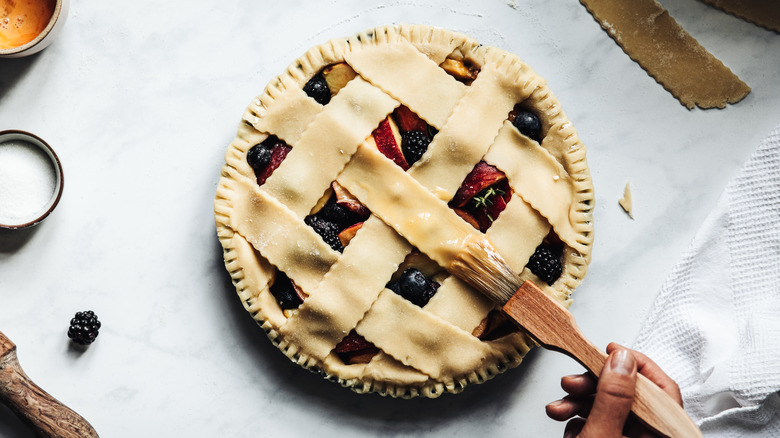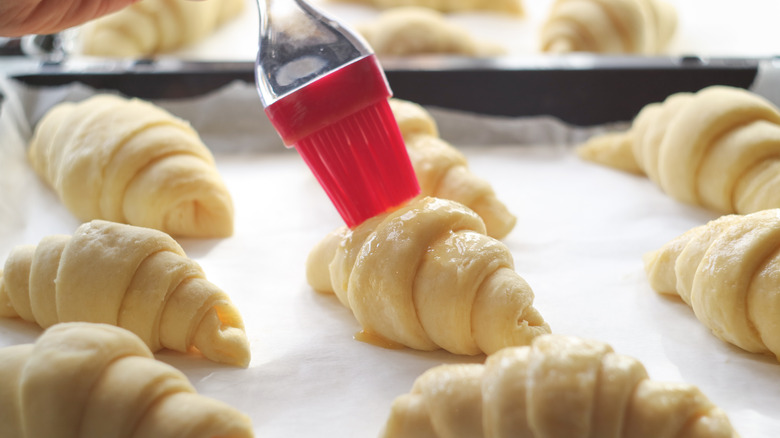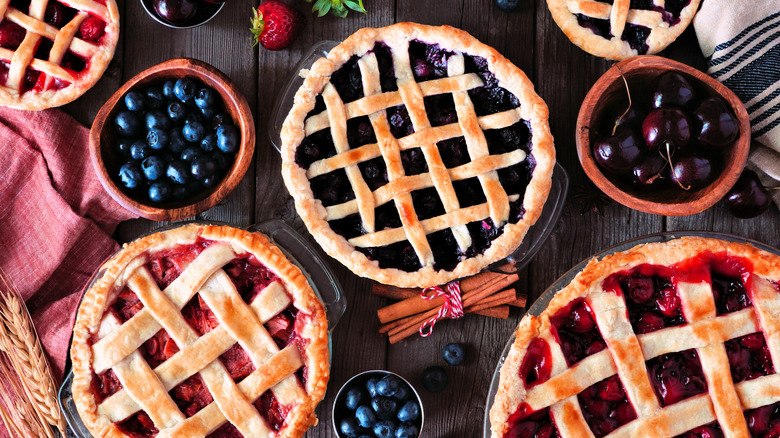How To Use Custard Powder As A Delicious Egg Wash Substitute
Is there anything better than a beautiful glossy finish on a baked good? This look is usually accomplished with an egg wash, but what if there was another simple way to achieve that same slick coating on your dough? Well, there is, and it's called custard powder. When diluted in water and brushed onto pastries as the final step before baking, custard powder can be an efficient egg wash substitute. It'll make your baked goods shiny and appetizing — as well as help the dough stick together when you're baking a prickly pear pie with a lattice top. If the plan is to add toppings, such as sugar, nuts, or dried fruit, custard powder will ensure these will stick to the dough.
Custard powder is usually used to make (you guessed it!) custard, which is an important ingredient in many recipes and can be used as filling for a gâteau Basque or as a key component in a cranberry custard trifle. The main ingredient of custard powder is cornstarch and there are some variations in the other ingredients, but it can also include sugar, vanilla flavoring, and milk powder. To give an example of how many forms there are to this recipe, the brand Bird's custard powder is made from cornstarch, salt, vinegar, and food coloring. It was invented by British chemist and food manufacturer Alfred Bird, dating back to 1837. However, no matter the ingredients, custard powder can easily be prepared at home or purchased at the store.
The differences between custard powder and egg wash
There are many variations of egg washes, such as a beaten egg that can be applied on its own or mixed with water, milk, or cream. The egg can also be used whole, just the yolk, or just the egg white. Each alternative gives a different finish to the pastry, and it depends on what the baker is aiming to achieve. Egg washes are used to give baked goods a golden and glossy finish, a crunchy texture, and to seal dough and help with adherence. To substitute egg wash with custard powder, you simply mix equal parts hot water and custard powder, and brush it on the pastries.
An experiment held by BAKERpedia compared the results of different types of egg washes and substitutes, and custard powder turned out to give the pastries a "smooth finish and a good shine." In opposition to an egg wash, custard powder wash won't give an additional golden color to the finished dessert. That's because the yellow color of the egg yolk can enhance the golden brown of the pastries when baked, and since custard powder wash doesn't contain egg, it won't have the same effect. However, since custard powder wash is liquid and sticky — especially if it contains sugar — it's very helpful to use as a binding and sealing agent.
Why use custard powder instead of egg wash?
You might choose custard powder as an egg wash substitute if you're allergic to eggs, or looking for a more budget-friendly option. However, there are many different alternatives, and egg wash substitutes like yogurt, for example, will do the job just fine. So why reach for custard powder as a substitute?
Well, many custard powder recipes include sugar, or even flavored custard powder recipes that will have ingredients such as cinnamon, strawberry extract, or the most common one, vanilla. Those bonus ingredients will add flavor to your baked goods, which can make for an even more tasty final result, one that not even egg wash or yogurt can provide. Custard powder also lasts longer in your pantry. If purchased at the store, it's important to pay attention to the best-by date, which is usually around six months once opened. But if made at home, you can use the shelf-life of the ingredients to estimate how long you can use it.
The main ingredient of custard powder is cornstarch, and according to the FoodKeeper App — a service developed by the USDA's Food Safety and Inspection Service, with Cornell University and the Food Marketing Institute — the item should be used within 18 to 24 months. But if your custard powder recipe includes milk powder, it's safe to assume that you can use your mix for roughly three months, which is the expiration date of opened milk powder. Knowing this, it's safe to assume that custard powder will last you much longer than eggs will.


